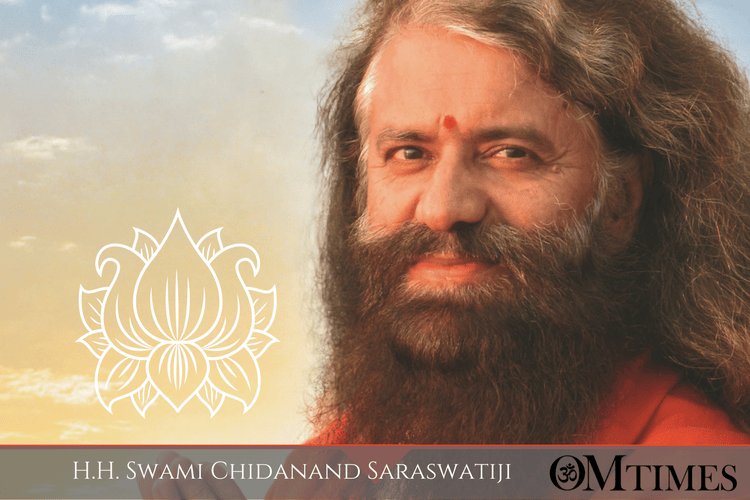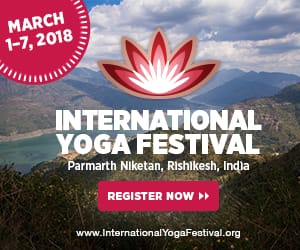H.H. Swami Chidanand Saraswatiji

H.H. Swami Chidanand Saraswatiji is the President and Spiritual Head of Parmarth Niketan Ashram in Rishikesh, one of India’s largest and most renowned spiritual institutions and the site of the annual International Yoga Festival. In addition, H.H. Swami Chidanand Saraswatiji is also the founder and spiritual head of the Hindu Jain Temple in Pittsburgh, PA.
H.H. Swami Chidanand Saraswatiji is the founder or co-founder of several humanitarian and environmental organizations which serve a number of causes, including the Ganga Action Parivar, to preserve and protect the Ganga river and its tributaries; India Heritage Research Foundation, which provides education, health care, youth welfare, and vocational training; the Divine Shakti Foundation, which provides education and assistance to widowed and impoverished women and children, as well as the protection of street animals in India such as cows and dogs; the Global Interfaith WASH Alliance to provide access to safe drinking water, improved sanitation and proper hygiene; and Project Hope, an umbrella organization that brings together various humanitarian and environmental organizations in times of disaster to provide both emergency relief and long-term rehabilitation.
It is our deep honor to be able to feature this exclusive interview with H.H. Swami Chidanand Saraswatiji in OMTimes Magazine.
Interview with H.H. Swami Chidanand Saraswatiji
OMTIMES: Your Holiness Swami Chidanand Saraswatiji, thank you for speaking with us. Pujya Swamiji, what is yoga to you?
H.H. Swami Chidanand Saraswatiji: The word ‘yoga’ means ‘union.’ Yoga is that which unfolds, awakens and becomes when the body, mind, and spirit align perfectly together. The purpose of yoga is to create a union both within ourselves and ultimately with the Divine.
Yoga is not a belief system, dogma or even a religion, it is an ancient scientific understanding of the pathway to liberation that has been passed down from our Rishis, Saints, and Sages for the benefit of mankind. In these very Himalayas, which are so conducive for divine inspiration, these Rishis performed severe austerities together with deep meditation and prayer. It was from their sacrifice the Masters have bestowed a treasure chest of wisdom for the benefit of humanity. Through their love of humanity and their grace, these teachings have been passed down through the millennia so that humankind can know how to live in balance and union with the Creator and His creation. Thus the science of yoga has given us the perfect vehicle for spiritual awakening and enlightenment.

It is important to know that Yoga is not a religion. It does not require you to believe in a certain God or to chant certain mantras. A belief system is not required to participate in yoga, yoga is the science of how to live the highest life.
These days, especially in the west, people take yoga classes to learn all about the various techniques of asanas, pranayama, and meditation. But yoga is so much more than that. Yoga is a way of life, and its teachings can penetrate every aspect of your being. Yoga off the mat is just as important as yoga on the mat. Yes, there are discernable physical and mental benefits of yoga on the mat, but it is important that we do not use yoga just to build slender and toned bodies. This is just one of the small consequences of asana practice, but it is not the purpose of yoga.
The purpose of yoga is to transform your being, to become the best version of you by connecting to your true self and the divine.
OMTIMES: Is there a particular yoga practice that you feel is best?
H.H. Swami Chidanand Saraswatiji: It is joyful to see the practice of yoga burgeoning throughout the world. Yet, I can also see that there is a rampant competition amongst the various styles, lineages and “brands” of yoga. People often ask “Which form of Yoga is the best?” I would say that if there can be a “best” and therefore a “worst,” then it is not yoga. If there is competition, criticism, back-stabbing and cheating, then it is not yoga. Yoga is co-operation. Yoga is togetherness.
The purpose of yoga is not in itself or by which asana, style or school of yoga it comes from. The purpose of yoga is to experience unity within and without. Where you see division, even if it is in your yoga class, then it is not yoga.
OMTIMES: Why does the world need yoga today?
H.H. Swami Chidanand Saraswatiji: Today the world needs yoga more than ever. Not for the fitness, health benefits or peace of mind it brings but because the world needs unity. Today, that which ails us as individuals, communities, societies, religious groups and nations, is actually separation. The borders and boundaries between ‘me’ and ‘you’ and ‘us’ and ‘them’ are thicker and more intractable than ever. Our personal frame of reference is narrowing each day.
Our culture has a beautiful phrase ‘Vasudhaiva Kutumbakam,’ which means the world is one family. It is so unfortunate that for many of us today we do not even think to identify ourselves as members of the world family. Rather, we find it easier to identify as members of a political party, religion, profession or social class. The boundary between them and us seems to be widening. That separation, that sense of ‘self’ versus ‘other’ is what permits us to dehumanize each other so drastically that we can be complicit, directly or indirectly, in others suffering and even death. Politicians, media, businesses all seem to be leading the race to separation with the belief that for one to win, someone else has to lose. We are fed this narrative of separation, and without awareness or self-reflection, we too can fall into this trap that there is an “us” and “them” and so long as the “us” are winning, we can convince ourselves that the “them” somehow deserve their lot.
Yoga is a solution. Yoga is a solution to all of these problems caused by separation. But it starts with the person. When one person knows their true value and connection to the web of life, they can be the light that changes the lives of those around them and the world.
As we first connect with divine prana (energy of life) through our breath, we realize that we are being nourished by the Universe and inextricably interconnected to the web of Life. This means we realize our value, our sacredness as well as our potential to heal, not hurt; to love, not hate and to be a light in this world. Yoga, therefore, is also a potential solution to that which ails our planet. When we realize our interconnectedness, then we naturally stand up and support our world and our actions and thoughts become those that bring peace and protection to not only those we love but for the whole planet.
OMTIMES: So many people are interested in yoga and take yoga classes all over the world, but how to get yoga into all aspects of your life, on and off the mat?
H.H. Swami Chidanand Saraswatiji: Yoga, as prescribed by Patanjali, is actually an eight-fold path of increasing levels of unfoldment. Asana is only one part; pranayama is another; meditation is still another. These aspects of the various paths require the student to gain mastery of their body, mind, and intellect. Through asanas, the limbs become comfortable and lose, through pranayama the vital energies are concentrated within, and through meditation, the mind becomes able to concentrate and in a single point.
With this sense of agency and mastery over one’s thoughts, emotions and physical well-being a student can turn to the other aspects of this path are called Yama and niyama. These can be loosely translated as the rules for righteous living. In general, Yama is exercising restraint over our lower, baser, animal-like instincts; for instance, overcoming greed, lust, anger, and envy, and never acting based on these impulses. Niyama be the embrace of higher, spiritual, humane values, such as being generous and selfless, cultivating piety, devotion, compassion, loyalty, and humility.
The concepts of Yama and niyama can be summed up as, “Do good and be good; do divine and be divine.” By living in the present moment and remaining calm no matter what is happening outside of you and by following these moral, ethical, and spiritual guidelines, one’s entire life will become balanced and comfortable.
OMTIMES: Do these rules for life apply to everyone? You are a Hindu swami, what about people who are not Hindu or live householder lives?
H.H. Swami Chidanand Saraswatiji: Gravity does not need you to believe in it, it’s simply there. If you jump from a wall, you will fall down despite your belief system. In the same way, the principles of yoga are based on spiritual laws or truths and yoga has beautifully and scientifically created a system whereby we can live in synergy with these spiritual laws and not against them. In the last decade we can see that scientific knowledge is catching up with, and indeed coming to the same conclusions, like spirituality. From the numerous studies showing the discernable benefit of meditation on peoples mental and physical health, or the curative properties of foods, to the detrimental effects of stressful living. This knowledge is becoming popular now, but these same truths have made available for all through the science of yoga for millennia.
People do say to me “I’m not Indian” or, “I’m not a Hindu, so I don’t have to follow these ethical laws.” Yet this is not true as not one of the eight limbs of yoga depends upon one’s belief. Yoga is based on universal laws or rules that, when followed, automatically lead to more peaceful, joyous and meaningful lives.
OMTIMES: What are some aspects of how we must examine our lives?
H.H. Swami Chidanand Saraswatiji: Self-awareness, honest contemplation and taking time to be with one’s Self-care all very important in deepening our spiritual connection, but this is one thing we must all examine, and that is if our diet is in concert with a yogic life? Awareness of nutrition has dramatically risen this last decade, and people are now also learning a lot about sattvic food, which means food that is fresh, easily digestible and leads to the health of the body and peace of the mind. Rather than talk to you about the intricacies of a sattvic diet though, I am simply going to personally ask you: Are you vegetarian? There is virtually nothing we can do to our bodies that is more contrary to the yogic life than eating meat.
To be a yogi is to be full of life but how we are full of life if our bodies are graveyards for dead animals? How can we be at peace if our food choices bring suffering and death to others?
So, if you are a vegetarian, great. It will not only improve your health, but it will change the very nature of your being if you eat a fresh, nutritious and balanced diet. If you are not a vegetarian, then do think about it. A vital aspect of a yogic life is that of contemplation and introspection. So we must take time to go inside ourselves and ask “What right do I have to take the life of another or cause suffering to others?” Watch how your mind comes up with arguments to rationalize the suffering you cause, watch those thoughts and then go deeper within and ask your heart if it wants to partake in this cruelty.
Creatrix from Sirius. Fairly Odd Mother of Saints (Bernards). Fish Tank aficionado by day ninja by night. Liane is also the Editor-in-Chief of OMTimes Magazine, Co-Founder of Humanity Healing International and Humanity Healing Network, and a Board Member of Saint Lazarus Relief Fund.









